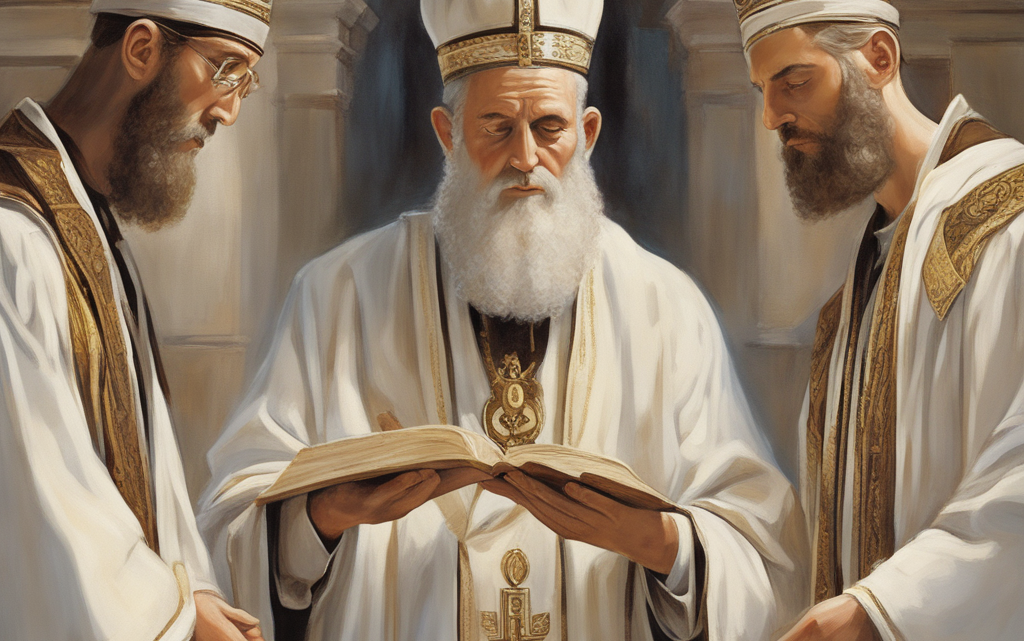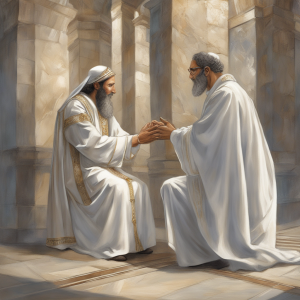The Aaronic Priesthood and the Ultimate Sacrifice of Yeshua: Divine Callings and the End of the Need for Earthly Mediators


The concept of the priesthood has deep roots in both Jewish and Christian traditions. Originating from the priestly lineage of Aaron, the role of the high priest has been one of immense importance in facilitating the relationship between humanity and the Divine. The high priest serves as a mediator, offering sacrifices and prayers to Yehovah on behalf of the people. However, the coming of Yeshua has presented a new paradigm that redefines our understanding of religious authority and divine intercession.
The Eternal Covenant of Aaron’s Priesthood
In traditional Jewish thought, the role of the priest, or Kohen, is considered to be an eternal covenant. This idea is firmly grounded in the Hebrew Bible. For instance, in Exodus 30:30, it is said, “You shall anoint Aaron and his sons, and consecrate them, that they may serve me as priests.” Similarly, Numbers 25:13 emphasizes that Aaron’s lineage will hold “a covenant of a perpetual priesthood” because of his zealousness for Yehovah and his role in making atonement for the Israelites.
The Talmud and other Rabbinic texts have fortified this belief, adding layers of tradition and interpretation that emphasize the sanctity and necessity of this role. The priestly lineage is responsible for specific religious duties, most importantly those related to the Temple in Jerusalem. Even today, in the absence of the Temple, descendants of Aaron known as Kohanim perform specific roles and honors within the synagogue service.
The Divinity of the Calling
The high honor and responsibility associated with being a high priest are not to be taken lightly. As stated in Hebrews 5:4, “And no man taketh this honor unto himself, but he that is called of God, as was Aaron.” This New Testament scripture underscores a principle that is universally acknowledged in both Jewish and Christian communities—that the position of religious authority comes from a divine rather than a human source. In the Hebrew Bible, Aaron didn’t choose this role for himself; rather, he was appointed by Yehovah through Moses.
Yeshua: The Great High Priest
For followers of Yeshua, the concept of the priesthood takes on an entirely new dimension. Yeshua, although not a descendant of Aaron, is considered the great high priest who has passed through the heavens (Hebrews 4:14). His sacrifice on the cross is seen as the ultimate offering, eliminating the need for further sacrifices and rendering the earthly Temple obsolete for those who believe in Him.
This belief stems from the idea that Yeshua’s sacrifice was perfect and complete, fulfilling the laws and prophecies of the Old Testament. As Hebrews 10:10 states, “By that will we have been sanctified through the offering of the body of Jesus Christ once for all.”
The Need for Earthly Mediators: A Shift in Perspective
If Yeshua’s sacrifice was indeed the final atonement required, what then is the role of the traditional priesthood today? In Christian thought, the role of earthly mediators is diminished in the light of Yeshua’s ultimate sacrifice. The need for an earthly temple, sacrifices, and a human high priest becomes moot when the heavenly high priest has already made the perfect offering.
Divine Will: The Restoration of the Priesthood
The question then arises: If Yehovah wanted the Aaronic priesthood to be restored, wouldn’t He be the one to do it? Given the omnipotence of Yehovah and the belief in His active role in human history, any resurgence of the traditional priestly role would undoubtedly be divinely orchestrated. However, from a Christian perspective, the coming of Yeshua makes this restoration unnecessary.
Conclusion
The Aaronic priesthood, rooted deeply in Jewish tradition and scripture, has been a key component of the relationship between Yehovah and His people. Yet, the New Testament introduces Yeshua as the ultimate high priest, fulfilling the law and making the ultimate sacrifice for humanity’s sins. This shift in religious thought marks the end of the need for earthly mediators, placing the focus on a direct relationship with the Divine through Yeshua. Whether or not one believes that the priesthood of Aaron could or should be restored, it’s essential to recognize that, in Christian thought, Yeshua has already fulfilled this role, serving as the eternal high priest in the order of Melchizedek, forever bridging the gap between humanity and Yehovah.

